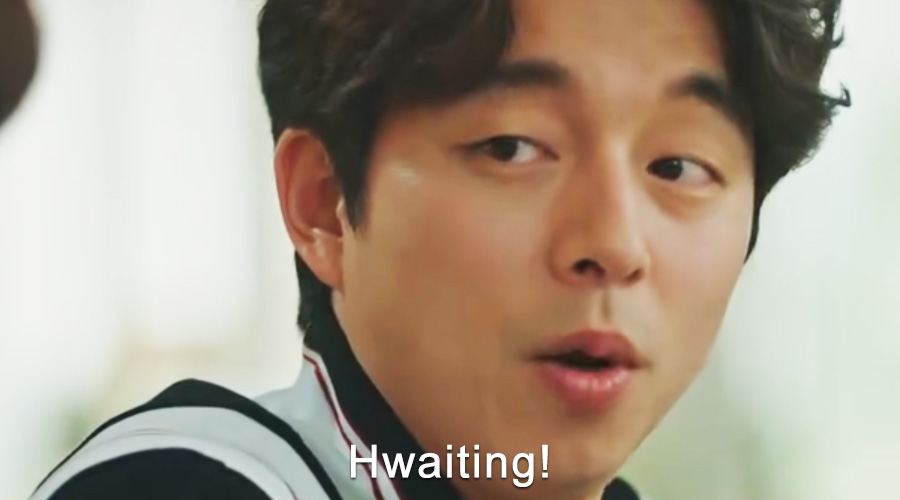
Caught yourself in a K-drama marathon, popcorn in one hand, tissue box in the other, and suddenly, amidst the emotional turmoil, you hear “Hwaiting!” and wonder, “What in the world of K-dramas does that mean?”
This little nugget of Korean culture has puzzled many of us non-Koreans initially. So if you want to learn more, let’s unravel the mystery of “Hwaiting” together, shall we?
First off, “Hwaiting” (or 화이팅) or “Paiting” for some Koreans, is a form of Konglish (Korean-English), where English words morph into uniquely Korean expressions, gaining new life and meaning.
It was derived from the English word “Fighting”.
Learn Korean Faster By Simply Watching K-Dramas
START for FREE to discover the easiest way to learn Korean while binging the best of K-Dramas and Korean TV. Highly Recommended.👍👍😃And by the way, “Hwaiting” is also not about throwing punches or getting into a brawl.
Surprised? Confused?
It’s something far more powerful. This phrase is a cheer, a rallying cry, a verbal pat on the back. Think of it as the Korean equivalent of “You got this!”, “Best of luck!”, or “Go for it!
It’s something far more powerful. This phrase is a cheer, a rallying cry, a verbal pat on the back.
Watch “Hwaiting!” Scenes
Scenes From Various K-Dramas
Think of it as the Korean equivalent of “You got this!”, “Best of luck!”, or “Go for it!”
It’s the boost of encouragement you need right before that make-or-break moment in your life … or in episode 14 when everything seems to go downhill for our protagonists.
But here’s where it gets interesting.
Why does “Hwaiting” have different translations?
Well, it’s all about context, my friends.
Language is a tricky beast, and Korean is no exception. The term “Hwaiting” is borrowed from English (yep, the word “fighting”), adapted into the Korean language for its phonetic similarity and energizing sound.
Language is a tricky beast, and Korean is no exception. The term “Hwaiting” (from the word “fighting”) was adapted into the Korean language for its phonetic similarity and energizing sound.
So, why the different translations?
Because “Hwaiting” is not just a word. It’s an emotion, an expression of support, enthusiasm, and solidarity.
Depending on the scene, it can mean “Good luck,” “Cheer up,” “Let’s do this,” or simply, “I believe in you.” It’s the Swiss Army knife of motivational phrases in the K-drama lexicon.
Depending on the scene, it can mean “Good luck,” “Cheer up,” “Let’s do this,” or simply, “I believe in you.” It’s the Swiss Army knife of motivational phrases in the K-drama lexicon.
Now, you might wonder, “Do real Koreans use ‘Hwaiting’ as much as K-dramas suggest?”
Absolutely!
It’s not just a dramaland invention.
From classrooms to offices, sports events to casual hangouts, “Hwaiting” is a staple in everyday Korean encouragement.
It’s the magical word that bonds teams, lifts spirits, and pushes individuals to overcome challenges.
So, yes, it’s as real as the tears you shed in that last K-drama episode (you know the one).
But here’s a thought-provoking question: Can a simple word really have the power to change outcomes?
Maybe not always.
But in the world of K-dramas and beyond, “Hwaiting” carries the weight of hope, the promise of perseverance, and the collective will to succeed. It’s a testament to the power of words, the strength of community, and the resilience of the human spirit.
But in the world of K-dramas and beyond, “Hwaiting” carries the weight of hope, the promise of perseverance, and the collective will to succeed. It’s a testament to the power of words, the strength of community, and the resilience of the human spirit.
So, next time you’re facing a daunting task, channel your inner K-drama lead, look in the mirror, and say “Hwaiting!” with all the conviction you can muster.
Who knows? It might just be the pep talk you need. And hey, if it works for our beloved K-drama characters, it’s worth a shot, right?
Now, I’m curious, have you ever used “Hwaiting” in real life? Did it make you feel like the hero of your own K-drama? Share your stories in the comments below. Let’s keep the conversation going and spread some “Hwaiting” cheer!
Did You Enjoy Reading This Article? 🤗
If you did, sign up and join 2,000+ K-Drama Fans. You'll get articles sent straight to your inbox. PLUS you'll also get this:












